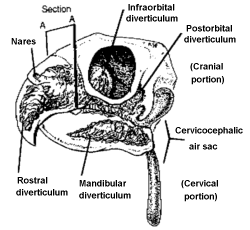When a distressed bird is taken to an avian veterinarian, respiratory disease is often found to be the cause. Frequent sneezing, nasal discharge, periocular swelling, coughing, wheezing, and a voice change may be evident. Dyspnea, or labored breathing, may be seen at rest or after the bird flies a short distance. “Tail bobbing” or a rhythmic jerking movement of the tail may also be observed.
Poor nutrition is a major factor in the development of respiratory tract disease. Vitamin A is essential for the health and integrity of the epithelial lining of the respiratory tract. Hypovitaminosis A, a deficiency in vitamin A, leads to changes in the respiratory epithelium which allow bacteria, virus, and fungi to invade the body. Poor nutrition also affects the immune system, further weakening the normal protective defense mechanisms of the avian repiratory tract.
Respiratory signs are not always the result of disease of the respiratory tract. Other disorders may mimic respiratory tract disease. Birds don’t have a diaphragm that separates their thoracic cavity from their abdominal cavity. As a result, abdominal fluid or ascites, an enlarged liver, or abdominal tumors may cause labored breathing.
The last two articles covered the anatomy of The Avian Respiratory System and some of the Avian Respiratory Disorders. This month’s article addresses additional avian respiratory disorders.
Common Disorders of the Respiratory Tract Part II
Voice Change
 The vocal folds of birds are located in the syrinx, not the larynx. The syrinx is located at the end of the trachea, where it divides into a left and right bronchus. Voice change or loss of voice may be caused by infection or inflammation. Aspergillosis, a fungal infection, is a fairly common cause of voice change. In budgies, an enlarged thyroid gland known as goiter can lead to squeaking or crying sounds as well as regurgitation and coughing. Goiter occurs as the result of an iodine deficiency and is common in budgies (and cockatiels as well as some other species) on an all seed diet. The enlarged gland compresses the trachea leading to respiratory difficulty and voice change. Goiter may be treated by changing to an appropriate diet and iodine supplementation.
The vocal folds of birds are located in the syrinx, not the larynx. The syrinx is located at the end of the trachea, where it divides into a left and right bronchus. Voice change or loss of voice may be caused by infection or inflammation. Aspergillosis, a fungal infection, is a fairly common cause of voice change. In budgies, an enlarged thyroid gland known as goiter can lead to squeaking or crying sounds as well as regurgitation and coughing. Goiter occurs as the result of an iodine deficiency and is common in budgies (and cockatiels as well as some other species) on an all seed diet. The enlarged gland compresses the trachea leading to respiratory difficulty and voice change. Goiter may be treated by changing to an appropriate diet and iodine supplementation.
Tracheal Foreign Body
An inhaled seed, splinter of wood, piece of toy or a dislarged fungal granuloma (walled off abscess) can cause a sudden onset of rapid and difficult breathing because it obstructs the flow of air into the respiratory tract. This is a medical emergency. An avian veterinarian will place the bird in oxygen, surgically place an ‘air sac’ tube and attempt to locate and remove the obstruction. In small birds, removal by suction may be attempted, while in larger birds, a laproscope may be introduced into the respiratory tract to visualize the obstruction and forceps may be used to remove it. Aspergillosis, if present, will be treated by appropriate antifungal medication.
Psittacosis/Chlamydial Infection
Chlamydial infection may cause sneezing, coughing, dyspnea (difficulty breathing) and a nasal and ocular (eye) discharge. Birds may be infected yet only show signs if they are stressed by overcrowding, malnutrition, breeding or other diseases. After diagnosis by appropriate test, chlamydia is treated by administering Doxycycline.
Aspergillosis
Aspergillosis is a very important fungal infection of birds, caused by the inhalation of fungal spores. Aspergillus fumigatus is the most common fungus found in the environment. It flourishes in a damp environment with decaying vegetation and may be a contaminant of seed mixes, peanuts, corn and corn bedding. If so would like to mention this as a warning.) Overcrowding , poor ventilation, malnutrition, other diseases and long term antibitoic therapy increase a bird’s susceptibility. The number of fungal spores inhaled, as well as the age of the patient, are important factors in the incidence of the disease. The very young and the very old have the greatest risk of developing aspergillosis.
Sudden death from an overwhelming exposure to fungal spore or chronic, progressive respiratory signs may occur. The treatment is very difficult and involves the use of antifungal medication and removal of fungal granulomas surgically when possible.
Inhaled Toxins
Birds are exquisitely sensitive to noxious vapors and fumes. Sudden death or progressive respiratory difficultly may occur. Cigarette smoke, fumes from gasoline, kerosine, ammonia, hairspray, and insecticides are all harmful. Especially hazardous is the inhalation of vapors from overheated teflon and self-cleaning ovens. This is known as teflon or polytetrafluoroethylene vapor toxicity. Teflon is also found in lamps, hair dryers, heaters, pots, pans and many other appliances. Inhalation of vapors from overheated teflon leads to rapid respiratory distress, convulsions and death in birds – long before signs occur in people. Treatment in very early stages consists of oxygen, steroids and antibiotics.

